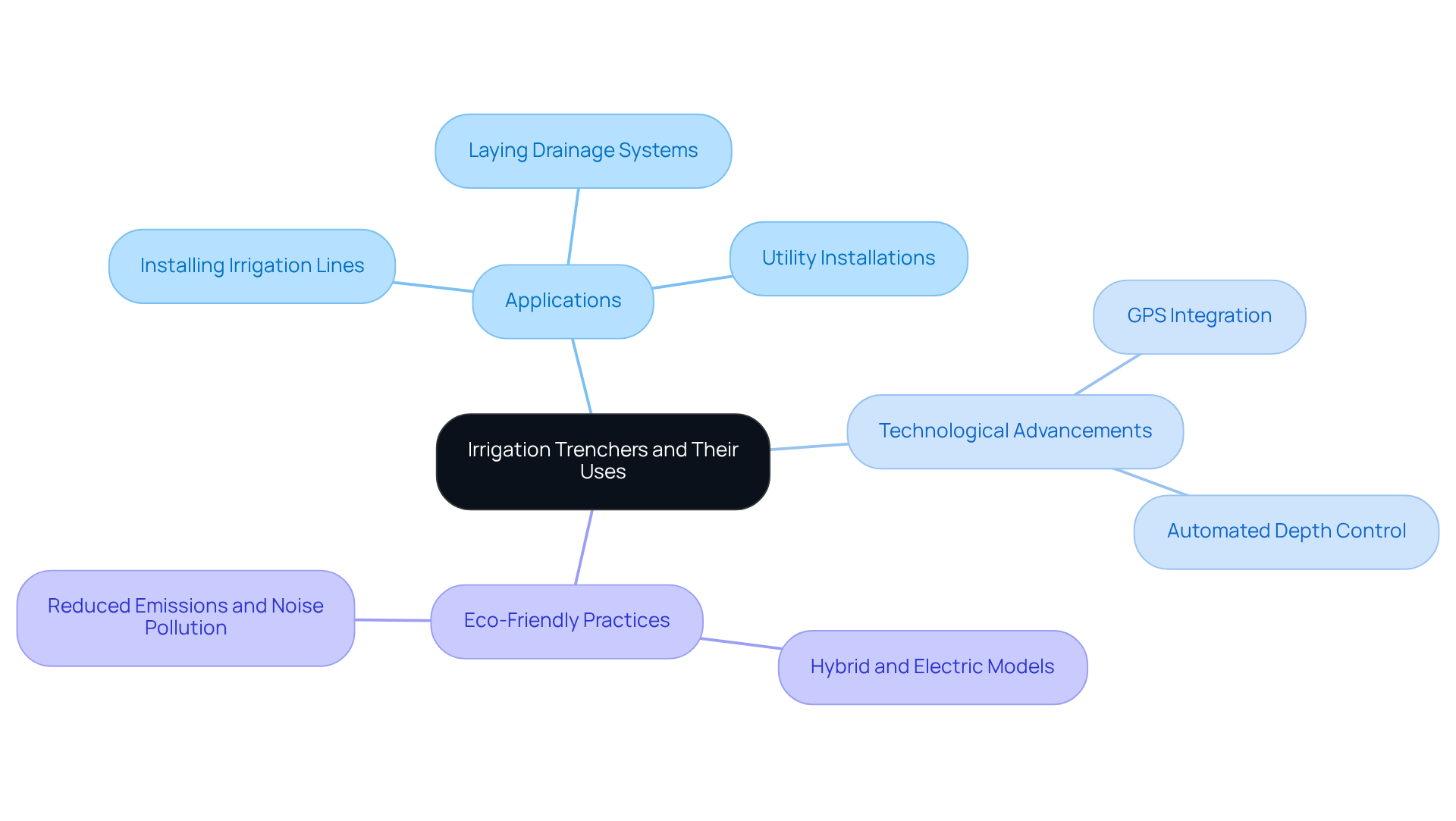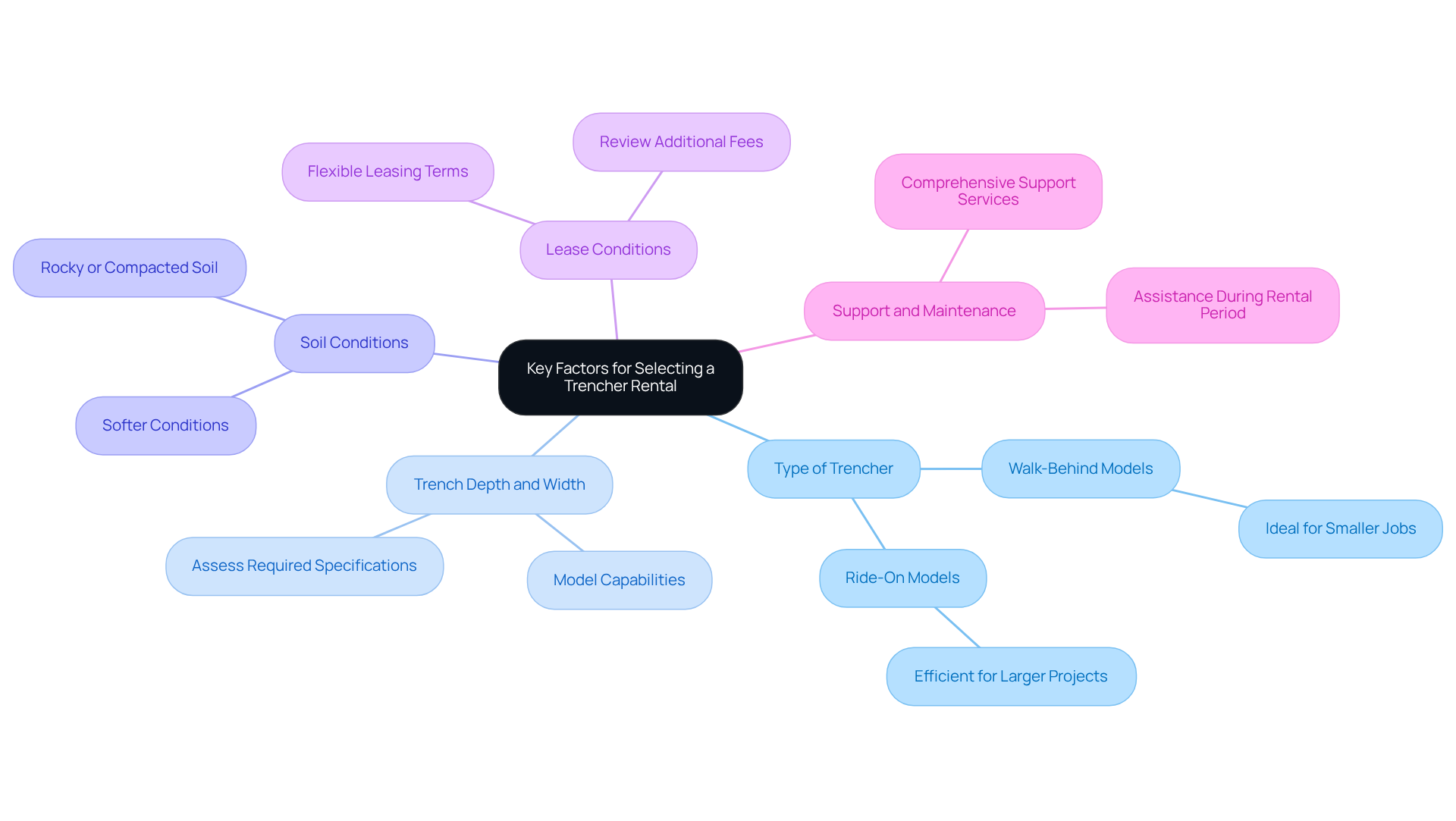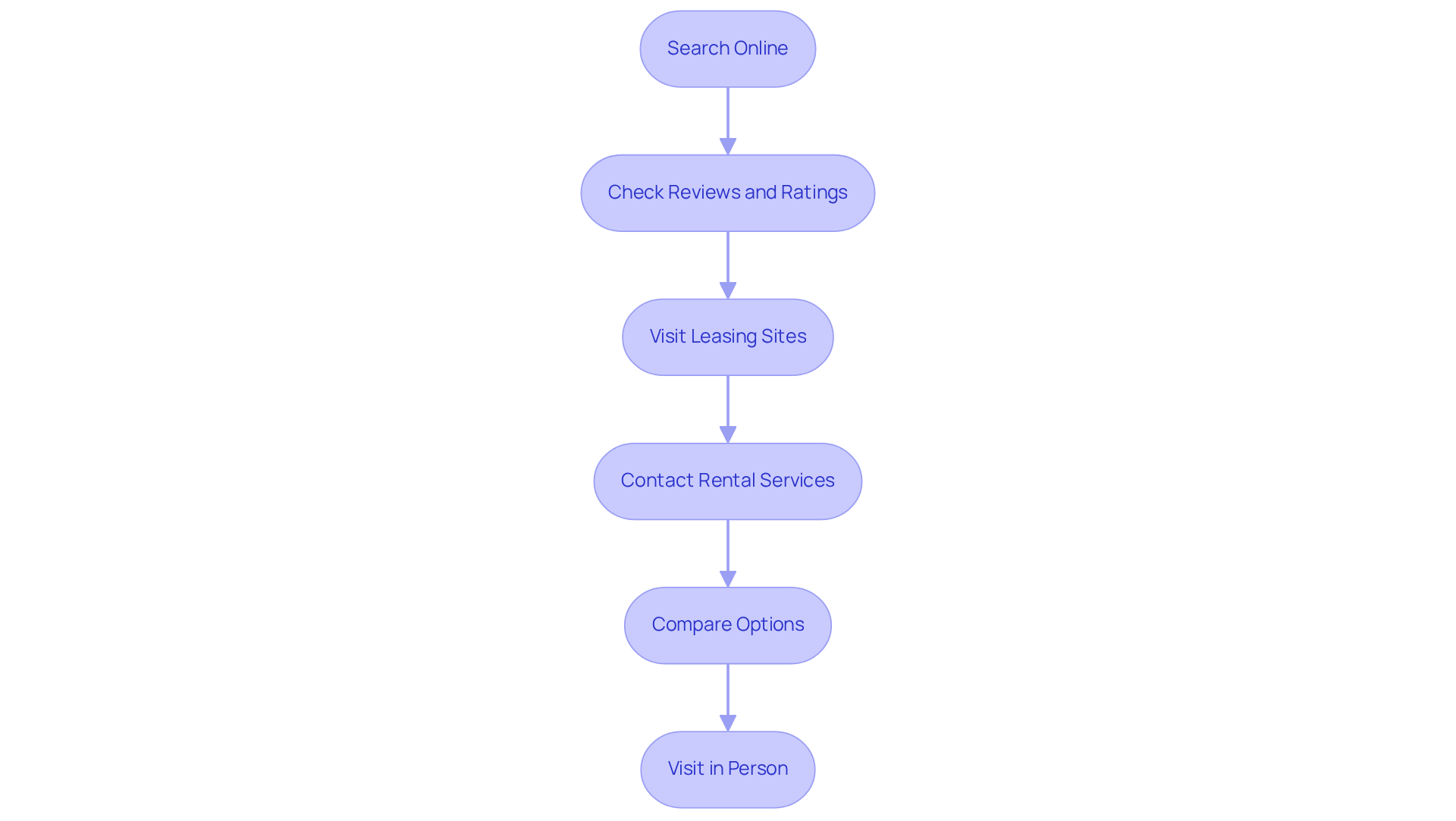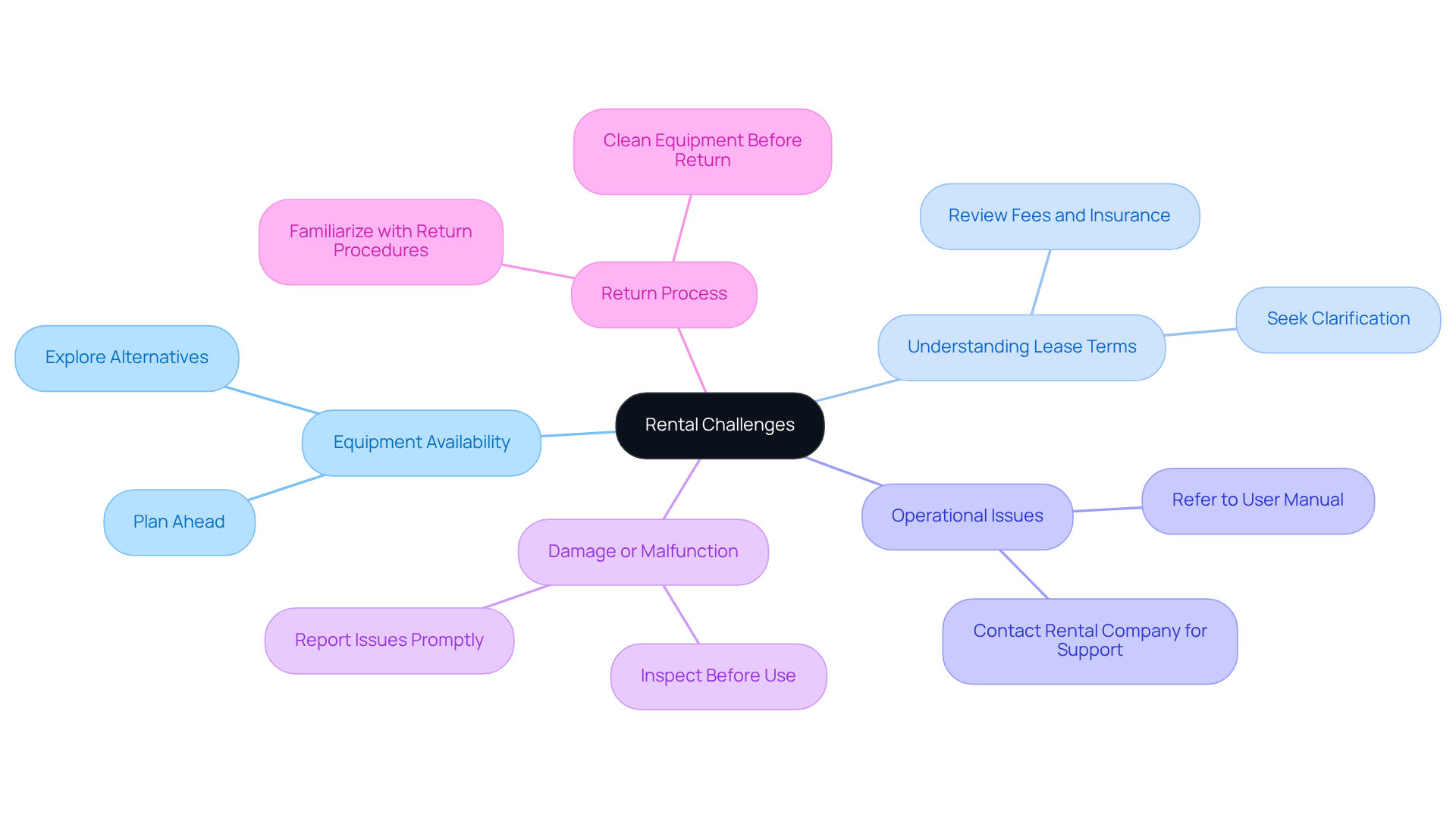Overview
The article serves as a comprehensive guide on effectively renting an irrigation trencher. It outlines essential considerations, including:
- The type of trencher
- Trench specifications
- Soil conditions
- Lease terms
- Available support services
By detailing these factors, the article not only informs but also empowers readers to make informed decisions that can optimize their landscaping projects. Furthermore, practical steps are provided for locating local rental options and troubleshooting common challenges, reinforcing the reliability and quality of the services discussed. Ultimately, this guide ensures that readers are well-equipped to engage with the rental process confidently.
Key Highlights:
- Irrigation trenchers are specialised machines for excavating channels for irrigation systems, enhancing water delivery efficiency.
- Key applications include installing irrigation lines, laying drainage systems, and utility installations.
- Recent advancements like GPS integration and automated depth control have improved trencher efficiency and sustainability.
- When selecting a trencher rental, consider the type of trencher, trench depth and width, soil conditions, lease terms, and support services.
- To locate local trencher rentals, search online, cheque reviews, visit leasing sites, contact services, compare options, and inspect equipment in person.
- Common rental challenges include equipment availability, unclear lease terms, operational issues, damage or malfunction, and understanding the return process.
Introduction
Irrigation trenchers serve as indispensable tools within the landscaping and agriculture sectors, meticulously crafted to create precise channels for effective water delivery systems. As advancements in technology continue to evolve, these machines are not only becoming increasingly efficient but also more eco-friendly, establishing them as a compelling choice for both professionals and DIY enthusiasts alike.
However, the process of selecting the right trencher rental can present challenges, as there are numerous factors to consider, including:
- Equipment type
- Local availability
What obstacles might one encounter during the rental process, and how can these be navigated to ensure a seamless experience? By understanding these elements, you can make informed decisions that enhance your project outcomes.
Understand Irrigation Trenchers and Their Uses
Irrigation diggers are specialized machines designed to excavate narrow channels for the installation of irrigation systems, ensuring efficient water delivery to plants and crops. These machines excel in various soil types and feature adjustable digging depths, making them suitable for both residential and commercial landscaping projects. Their key applications include:
- Installing irrigation lines: Trenchers create precise pathways for pipes that transport water to gardens and agricultural fields, enhancing irrigation efficiency.
- Laying drainage systems: They facilitate the management of excess water by digging trenches for drainage pipes, preventing waterlogging and promoting healthy plant growth.
- Utility installations: Trenchers are also utilized for laying electrical or communication lines alongside irrigation systems, streamlining multiple installations in one operation.
Recent advancements in irrigation equipment technology, such as GPS integration and automated depth control, have significantly improved their efficiency and precision. For example, the introduction of hybrid and electric models has reduced emissions and noise pollution, aligning with the industry's shift towards sustainability. Landscaping professionals have noted that these innovations not only enhance operational efficiency but also contribute to eco-friendly practices in landscaping projects.
Understanding these applications and advancements will assist you in determining whether an irrigation trencher rental near me is the right option for your forthcoming landscaping project.

Identify Key Factors for Selecting a Trencher Rental
When selecting an irrigation trencher rental near me, it is essential to consider several key factors to ensure optimal performance and satisfaction.
-
Type of Trencher: Various types of trenchers are available, including walk-behind and ride-on models. Walk-behind models are ideal for smaller jobs, whereas ride-on versions excel in larger projects, providing efficiency and effectiveness.
-
Trench Depth and Width: Assess the required depth and width of the trench you need to dig. Different trenchers available for irrigation trencher rental near me have varying capabilities; therefore, ensure the model you choose can meet your project specifications.
-
Soil Conditions: Evaluate the soil type in your work area. Certain trenchers are designed to handle rocky or compacted soil, while others perform optimally in softer conditions, ensuring you select the right equipment for your environment.
-
Lease Conditions: Carefully review the leasing agreement. Look for flexible leasing terms for your project timeline and budget when considering irrigation trencher rental near me. Be aware of any additional fees or stipulations associated with the leasing process to avoid surprises.
-
Support and Maintenance: Choose a leasing company that offers comprehensive support and maintenance services. This ensures you have assistance readily available should any issues arise during your rental period, providing peace of mind and reliability throughout your project.

Locate and Evaluate Local Trencher Rental Options
To effectively locate and evaluate local trencher rental options, adhere to the following steps:
- Search Online: Utilize search engines to identify equipment leasing companies in your vicinity. Employ keywords such as 'trencher lease near me' or 'irrigation trencher rental near me' to yield beneficial results.
- Check Reviews and Ratings: Investigate customer feedback on platforms like Google, Yelp, or specialized review sites. Focus on insights regarding equipment quality and customer service to gauge reliability.
- Visit Leasing Sites: Navigate the websites of local leasing businesses. Scrutinize their inventory for available trenchers, pricing options, and any additional services they may offer.
- Contact Rental Services: Engage directly with leasing services to inquire about availability, terms of use, and any specific questions you might have. This interaction also provides insight into their customer service approach.
- Compare Options: Compile a list of potential leasing companies and assess their offerings, prices, and terms. Take into account factors such as proximity, leasing rates, and the condition of the tools.
- Visit in Person: If feasible, visit the rental locations to inspect the equipment firsthand. This allows for a thorough evaluation of the equipment's condition and the opportunity to ask any final questions about the irrigation trencher rental near me.

Troubleshoot Common Rental Challenges
Renting a digging machine can be a straightforward process, yet challenges may arise that require attention. Here are some common issues and effective troubleshooting strategies to consider:
-
Equipment Availability: When the trencher you require is unavailable, explore alternative models or rental companies. Planning ahead and securing an irrigation trencher rental near me in advance can help you avoid last-minute complications. The American Rental Association reports that leasing penetration in the U.S. has reached 56.4%, highlighting a competitive market where demand often exceeds supply. Furthermore, the labor shortage in the leasing industry is anticipated to worsen due to an aging workforce, complicating equipment availability even further.
-
Understanding Lease Terms: Should you find the lease agreement unclear, do not hesitate to seek clarification from the leasing service. It is essential to fully comprehend all terms, including fees, deposit requirements, and insurance coverage, to ensure a smooth rental experience.
-
Operational Issues: If you encounter difficulties while operating the trencher, refer to the user manual provided by the leasing service. Should problems persist, reach out to the rental company for technical support. Industry experts emphasize that operator feedback is vital for improving maintenance practices and enhancing equipment reliability.
-
Damage or Malfunction: Inspect the trencher prior to use and document any existing damage. If you notice any malfunctions during your leasing period, report them promptly to avoid being held liable for pre-existing issues. This proactive approach is essential, as 40.2% of fleet managers have indicated increasing maintenance budgets to extend the useful life of machinery.
-
Return Process: Familiarize yourself with the return procedure outlined in your leasing agreement. Ensure that you return the equipment on time to avoid late charges, and clean the equipment as necessary to meet the company's standards. Understanding these procedures will help streamline the return process and foster a positive relationship with your rental provider.

Conclusion
Irrigation trenchers are indispensable in optimizing water delivery systems for both residential and commercial landscaping projects. A thorough understanding of their applications and the latest technological advancements reveals that choosing the right trencher rental is essential for successful irrigation installations. This guide offers valuable insights into the various types of trenchers, key factors to consider when selecting a rental, and effective strategies for navigating common challenges in the rental process.
Key considerations when renting an irrigation trencher include:
- The type of machine
- Trench specifications
- Soil conditions
- Leasing terms
- The significance of support services
Each factor plays a crucial role in ensuring that the selected equipment aligns with the specific requirements of your project, thereby minimizing potential issues. Moreover, conducting diligent research and engaging directly with local rental services can significantly enhance your rental experience.
Ultimately, the value of this guide lies in empowering readers to make informed choices regarding irrigation trencher rentals. By adhering to the outlined steps and recommendations, individuals can streamline their landscaping projects while promoting more sustainable irrigation practices. Embracing these insights not only facilitates efficient water management but also lays the groundwork for successful and environmentally responsible landscaping endeavors.
Frequently Asked Questions
What are irrigation trenchers used for?
Irrigation trenchers are specialized machines designed to excavate narrow channels for the installation of irrigation systems, ensuring efficient water delivery to plants and crops. They are used for installing irrigation lines, laying drainage systems, and utility installations.
How do irrigation trenchers improve irrigation efficiency?
Trenchers create precise pathways for pipes that transport water to gardens and agricultural fields, which enhances irrigation efficiency by ensuring water is delivered directly where it is needed.
Can irrigation trenchers be used for drainage systems?
Yes, irrigation trenchers facilitate the management of excess water by digging trenches for drainage pipes, which helps prevent waterlogging and promotes healthy plant growth.
What other utilities can be installed using irrigation trenchers?
Trenchers can also be utilized for laying electrical or communication lines alongside irrigation systems, allowing for multiple installations in one operation.
What recent advancements have been made in irrigation trencher technology?
Recent advancements include GPS integration and automated depth control, which have improved the efficiency and precision of trenchers. Additionally, hybrid and electric models have been introduced, reducing emissions and noise pollution.
How do these technological advancements contribute to sustainability?
The introduction of hybrid and electric models aligns with the industry's shift towards sustainability by reducing emissions and noise pollution, which supports eco-friendly practices in landscaping projects.
Why is it important to understand the applications and advancements of irrigation trenchers?
Understanding these applications and advancements will help you determine whether renting an irrigation trencher is the right option for your forthcoming landscaping project.




